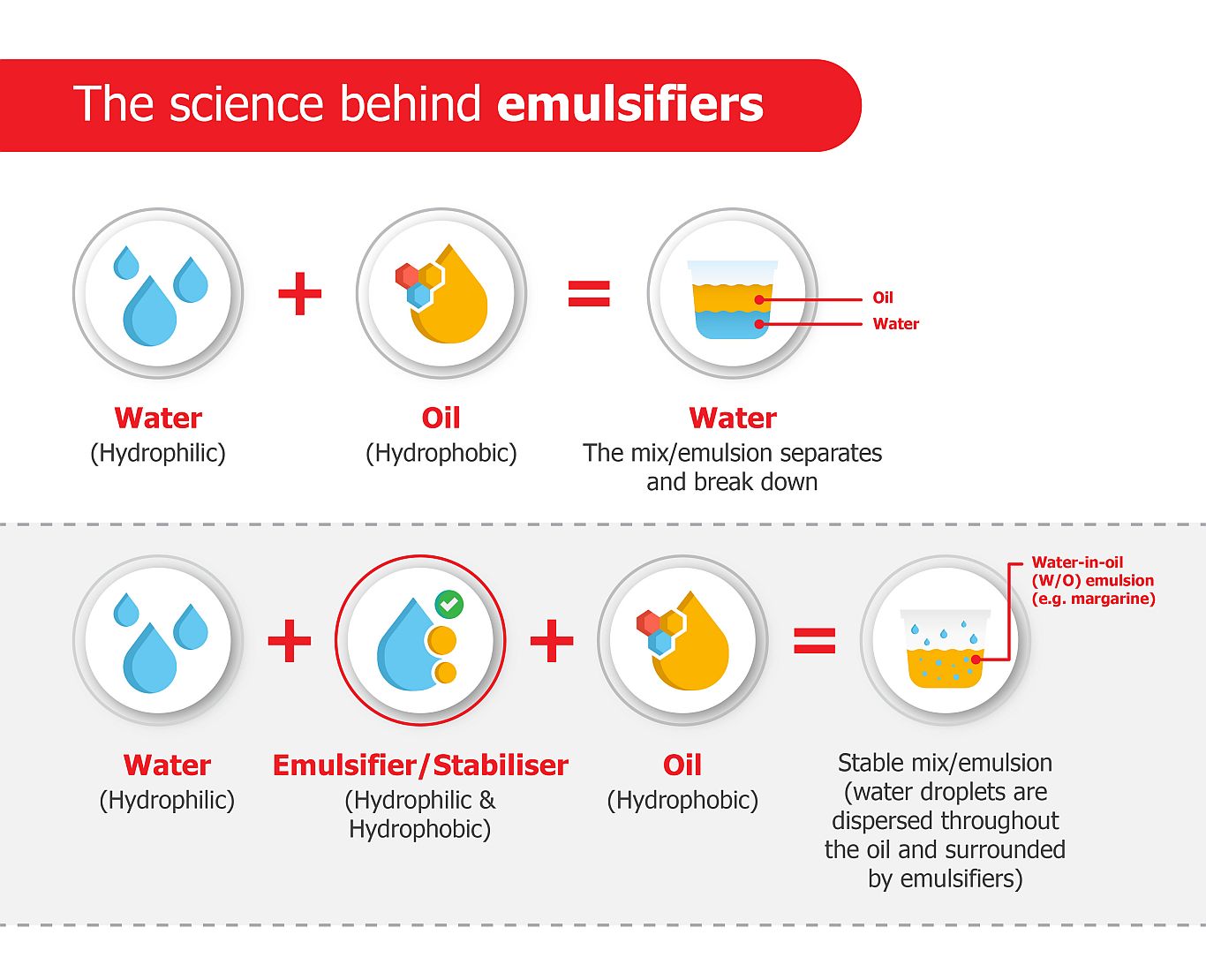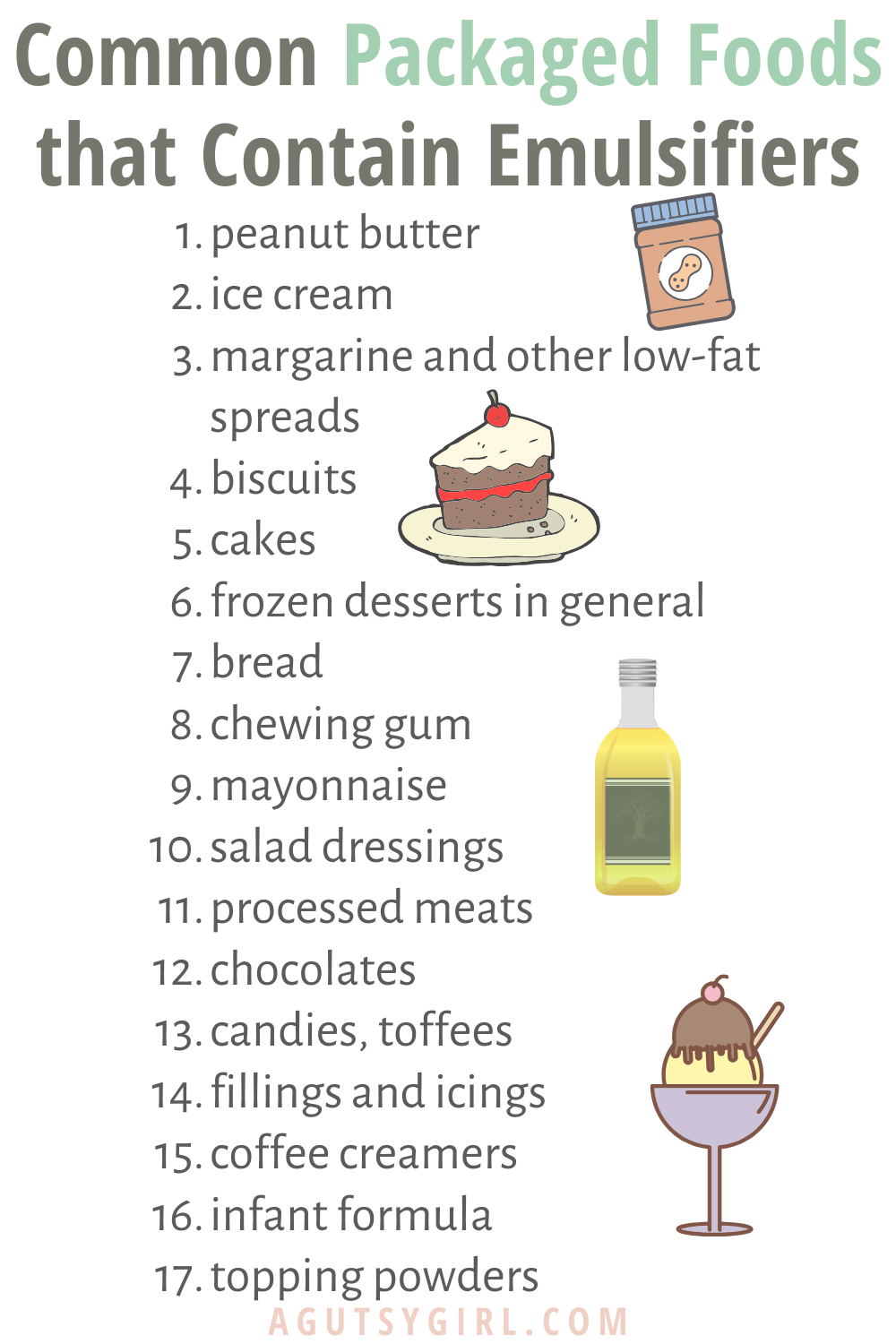Emulsifiers in Paint: Enhancing Durability and Application Quality
Emulsifiers in Paint: Enhancing Durability and Application Quality
Blog Article
The Scientific research Behind Emulsifiers and Their Relevance in Modern Production
Emulsifiers play an important role in modern-day production, acting as the unrecognized heroes that blend oil and water for a wide variety of items. As consumer preferences change in the direction of cleaner labels, the need for innovative emulsifiers is expanding.
What Are Emulsifiers?
Emulsifiers are important representatives in the world of food and product production, acting as the glue that binds two or else immiscible liquids, like oil and water. Usual instances include lecithin located in egg yolks and soybeans, and mono- and diglycerides utilized in numerous refined foods.

When you whip up a salad dressing or indulge in a creamy treat, emulsifiers aid maintain that excellent appearance. Without emulsifiers, many foods would certainly divide, leading to unwanted structures and tastes.
The Chemistry of Emulsification
When you blend oil and water, you may observe they don't blend easily; that's where the chemistry of emulsification enters play. Emulsification takes place when small droplets of one liquid disperse in an additional, developing a steady mix. This happens because oil and water are immiscible due to their varying polarities-- water is polar while oil is non-polar. To overcome this challenge, emulsifiers are employed.
When you include an emulsifier, its molecules place themselves at the oil-water interface, lowering surface stress and enabling the beads to mix. The emulsifier creates a protective layer around each bead, preventing them from integrating back into different layers.
Sorts Of Emulsifiers
Different types of emulsifiers play necessary roles in supporting mixtures of oil and water. You'll commonly encounter 2 major classifications: all-natural and synthetic emulsifiers. Natural emulsifiers, like lecithin from egg yolks or soy, are acquired from plants and animals, making them popular in foodstuff. They're generally taken into consideration safer and much healthier alternatives.
On the other hand, synthetic emulsifiers, such as mono- and diglycerides, are chemically engineered to enhance security and service life. They're typically used in processed foods and cosmetic products.
Furthermore, you could find non-ionic, anionic, and cationic emulsifiers, each with special homes that affect their efficiency. Non-ionic emulsifiers, for instance, work well in a large variety of pH degrees, while anionic emulsifiers tend to perform better in alkaline problems. Understanding these kinds can assist you select the best emulsifier for your certain application.
Systems of Emulsion Development
Recognizing how emulsions form is essential for developing stable combinations of oil and water. Solutions happen when you disperse little droplets of one liquid right into another immiscible liquid, such as oil in water. This process requires energy, usually supplied via frustration or blending. When you introduce an emulsifier, it reduces the surface area tension between both fluids, enabling them to mix even more conveniently.
The emulsifier molecules have a hydrophilic (water-attracting) head and a hydrophobic (oil-attracting) tail. When you add an emulsifier, these particles arrange themselves at the oil-water user interface.
Applications of Emulsifiers in Various Industries
Emulsifiers play a vital duty throughout numerous markets, making your favored foods smoother and extra enjoyable. In cosmetics, they enhance item structure and security, making certain a pleasurable application experience. And also, in drugs, they help deliver necessary ingredients successfully, boosting total efficacy.
Food Market Makes Use Of
While you might not recognize it, emulsifiers play an important function in the food industry, boosting the structure, stability, and service life of numerous items (Emulsifiers). They're generally located in salad dressings, sauces, and mayonnaise, aiding to mix oil and water for a smooth, regular product. In find out here now baked goods, emulsifiers boost dough handling and retain moisture, leading to a far better structure and prolonged quality. They're also crucial in milk items, where they maintain emulsions in creams and ice creams, avoiding separation. Also in treats, emulsifiers aid preserve crunchiness and stop stale flavors. By guaranteeing harmony and quality, emulsifiers are considerable to supplying the delicious items you enjoy everyday, making them an indispensable component in modern food production.
Aesthetic Formulas Advantages
When it comes to cosmetic formulations, emulsifiers are important for producing products that really feel lavish and execute properly. You'll observe that emulsifiers enhance item security, preventing splitting up and prolonging rack life. On the whole, emulsifiers play a crucial duty in supplying top quality cosmetic items that satisfy your beauty requirements.
Drug Applications Overview
In the pharmaceutical sector, emulsifiers are crucial for developing efficient medications. You'll discover emulsifiers in various dose types, like lotions, ointments, and liquid suspensions, enhancing the bioavailability of medicines.
The Effect of Emulsifiers on Product Top Quality

By ensuring stable solutions, you minimize the risk of wasting and prolong rack life, ultimately saving you time visit and money. You'll likewise locate that emulsifiers can improve the bioavailability of active components in your items, making them more efficient for consumers.
In addition, they allow you to create innovative formulations that satisfy varied customer needs. Whether you're crafting a luscious dressing or a lavish cream, emulsifiers are crucial for accomplishing the desired outcomes. Simply put, by recognizing and leveraging the impact of emulsifiers, you can greatly elevate the high quality of your products.
Future Patterns in Emulsifier Growth
As the need for cleaner labels and sustainable items increases, the growth of brand-new emulsifiers is readied to advance substantially. You'll observe a change towards plant-based and natural emulsifiers, driven by customer preferences for ingredients that are eco-friendly and much less processed. Innovations in biotechnology will likely boost the functionality and performance of these emulsifiers, allowing suppliers to produce steady solutions with fewer ingredients.
You may also see a boost in multifunctional emulsifiers that not just stabilize emulsions but also improve taste, texture, or dietary value. This fad could simplify component lists while improving product efficiency.
Moreover, with advancements in nanotechnology, emulsifiers might be engineered at the molecular level to achieve unmatched security and effectiveness. Emulsifiers. As you check out these fads, you'll locate that the future of emulsifier development is not practically performance, yet additionally about embracing sustainability and transparency in ingredients
Frequently Asked Inquiries
Are Emulsifiers Safe for Intake in Food Products?
Yes, emulsifiers are usually risk-free for intake in food items. They've been extensively examined and approved by food security authorities, so you can enjoy your favored foods without bothering with their influence on your wellness.
Can Emulsifiers Be Derived From Natural Sources?
Yes, you can obtain emulsifiers from all-natural resources. Active ingredients like lecithin from egg yolks or soybeans and casein from milk are typical. These all-natural emulsifiers assist maintain combinations without artificial additives, making them prominent in numerous products.

Exactly How Do Emulsifiers Affect Life Span of Products?
Emulsifiers support combinations, preventing separation and wasting - Emulsifiers. By maintaining uniformity, they extend products' service life, making sure quality and high quality. You'll discover that emulsifiers help maintain your preferred foods and cosmetics executing well over time
What Are Prospective Adverse Effects of Emulsifiers?
You might experience gastrointestinal concerns when consuming items with emulsifiers, as they can interfere with intestine germs. Some studies recommend potential links to inflammation this content or allergies, but much more research study is needed to fully recognize these impacts.

Exist Alternatives to Typical Emulsifiers?
Yes, there are choices to standard emulsifiers. You can explore options like all-natural periodontals, starches, or lecithin. Each different deals special residential properties, so experiment to locate what works best for your details application.
Report this page